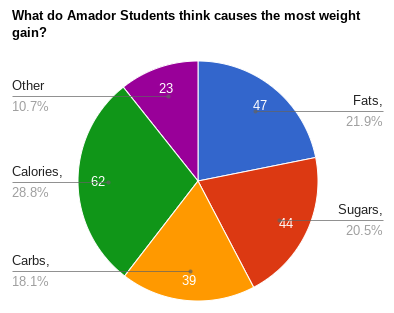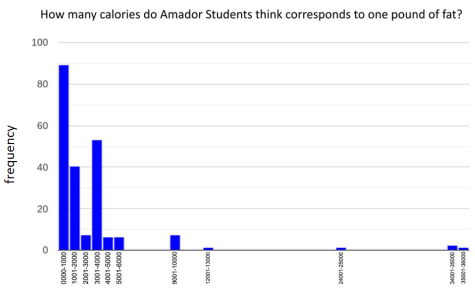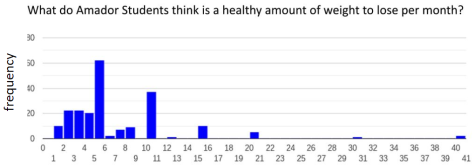Food and weight: misconceptions and how to correct them to reach your goals
People from all generations have been concerned with their self-image, especially maturing teens. This has caused many misconceptions to form over time. When we surveyed Amador Valley High School’s students about these misconceptions, our results were very concerning.
Some of the most popular diets out there shun a particular food group or nutrient. These can be carbohydrates, like the Keto Diet, sugars, meats, fats, and sometimes combinations of these.
These diets, along with the considerable publicity they often receive via social media, have made people forget how weight gain works. In our survey of 215 students, just under 30% correctly identified what causes both weight gain and loss: calories.
“I think the most common misconception in regard to nutrition and eating habits is that there are bad foods and good foods. This simply is not true. Whether you eat a candy bar or an apple with peanut butter, you are nourishing your body,” said Alexandria Wesenberg, a 2013 Amador Valley alumni with a bachelor’s degree in nursing who now works in a clinic for those suffering from eating disorders.
Harvard Health backs up this claim, stating, “If you consistently burn all of the calories that you consume in a day, you will maintain your weight. If you consume more energy (calories) than you expend, you will gain weight.”.
Over 70% of Amador students, however, believe the cultural idea that certain foods are bad because of what nutrients they contain, the most prevalent answer after calories being fats.

“If we continue to push the narrative that some foods are bad, this can lead to anxiety around food choices, restriction, and even possibly eating disorders,” said Ms. Wesenberg.
This concern is not unfounded either. Of the 215 students interviewed, 20% reported eating two or fewer meals per day.
“This is terrifying news,” said Wesenberg. “But unfortunately not surprising because of the society we live in.”
The culture around food and eating needs to change, but first, students must understand how weight really works. So how do calories actually affect the body?
How to eat for your weight goals
When asked how many calories students thought equated to one pound of fat, most Amador students answered over 1000 calories more or less than the true amount: 3500 calories.

Caloric maintenance varies based on many factors but can be calculated online to get rough estimations of your caloric maintenance. It’s recommended to also log your weight change to determine the accuracy of these numbers.
In order to gain weight over time, you have to eat over your daily maintenance or eat surplus calories. This is because excess calories are stored in the body as fats.
Inversely, to lose weight, you have to eat under your caloric maintenance or eat in a caloric deficit. This will cause these fats to be burned in order for your body to reach its maintenance.
It’s important to understand that going too far above or below your maintenance can be unhealthy as well. When Amador students were asked how many pounds they thought were healthy to lose in one month’s time, many answered very high.
“Any student who is losing or gaining weight rapidly should consult a trusted healthcare provider,” said Wesenberg.
Generally, it is recommended to gain or lose weight at a rate of four to eight pounds per month. This is because the human body can only handle so much change so quickly.
With all of this knowledge, students can start to see past all the dangerous fads and diets that pop up in today’s society. However, it’s important to also consider both why and how you are going about this process.
“What I hope for Amador students is that they are able to step back from diet culture and reflect on why they have weight goals,” said Wesenberg. “Rather than focusing on weight gain or loss, the hope is for people to focus on their abilities instead! A number [weight] doesn’t mean anything, but maybe students want to lift heavier, run faster, etc. they should focus on providing their bodies with the nutrition it requires, which means eating enough carbs, fats, and protein.”

This notion is also backed wholeheartedly by Amador Valley’s own health clerk, Pamela Lucero, who is also a registered dietician.
“If all your calories are coming from non-nutritional foods, for example, snacky things [like] crackers, chips, candy… those calories are never going to be the same as chicken, broccoli, zucchini, eggs,” said Lucero in an interview.
What’s more important than weight, which both Lucero and Wesenberg both emphasized, is eating healthy in order to feel healthy. Providing your body with all the nutrients it needs is more important than raw calories and weight.
Your donation will support the student journalists in the AVJournalism program. Your contribution will allow us to purchase equipment and cover our annual website hosting costs.

